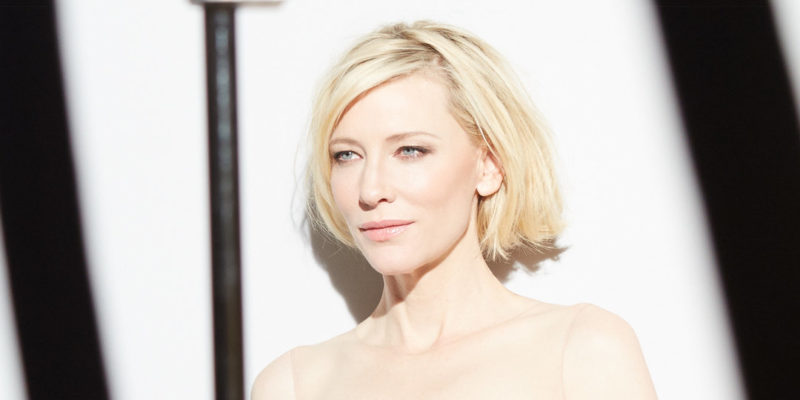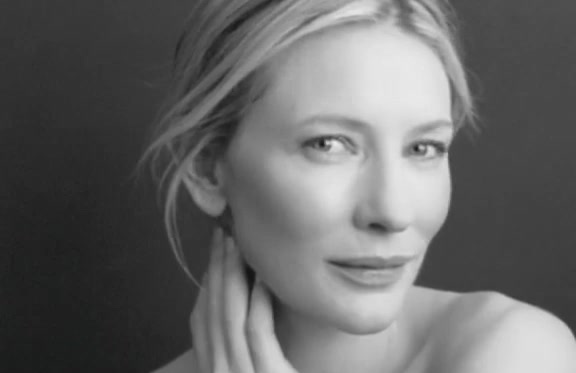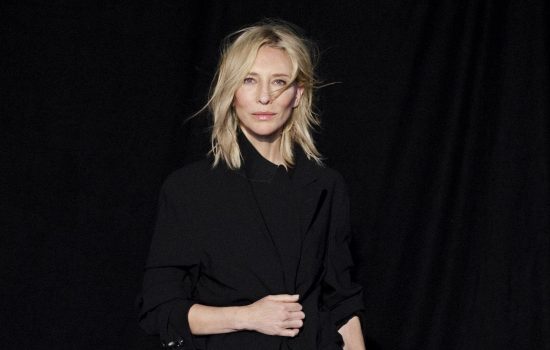Hello everyone! New interview with Cate for T Magazine/ The New York Times Style Magazine and a new image from the campaign’s set. Enjoy!

The title of “The Present,” now playing on Broadway, is a clever one. The play takes place at a summer house in Russia on the occasion of a 40th birthday, and there are a few physical gifts in play — notably, a chess set and an antique gun. (The play is a Chekhov adaptation, so yes, both get used before the final curtain falls.) But it’s also concerned with the specters raised by “the present” as a concept, particularly in a group of friends with years of history between them: How does the past of each relationship impact how we might feel about it now? How much can we ever depend on the future?
The linchpin of the proceedings is the birthday girl, Anna, played by Cate Blanchett with wit, grace and physical deftness. She spends much of the play’s first half smiling in amusement, resolutely unruffled by the impassioned meltdowns of those around her, and much of its second half shouting and seducing and dancing on tables. During a busy time for Blanchett — in addition to the three-hour run of the play each night, she’s also the face of Armani’s Sì fragrance, which launches a new iteration of its Rose Signature scent next month — she answered a few questions for T.
When watching “The Present,” we get the impression that all of these characters are entrenched in ways of relating to each other, which then transform or explode as the play goes on. How did that back story take shape for you?
I think you’re absolutely right. The characters all want things from each other that they can’t deliver on; they’re all in love with the wrong person at the wrong time. A 40th birthday with a lot of alcohol and unresolved lust and longing is a very combustible set of circumstances. It was really exciting to work with people that I’ve worked with for a long time on this, because in Chekhov, not a lot happens, but everything happens. It’s all about time spent with each other.
Continue reading the main story
You’ve spent a long time with Anna by now — you were playing her when you were interviewed for an August 2015 T cover story. Are you still discovering new things about her and about this story as you continue to play it?When you work with really playful, inventive, intelligent actors who are very open, as I’m having the great good fortune to do right now, I think it constantly opens up; and if the work is rich and deep, it’s a joy to return to it. We first performed it about 18 months ago, and then we had a hiatus and people went off and did other things, and then we came back together. We sort of collided with the past experience, but took it somewhere — not different, but somewhere deeper.
I don’t know if you’ve ever had that experience of driving home, and the route is exactly the same, but you’re preoccupied with something different, so you forget how you got here. On a good night, that’s the experience you have in the theater. People are always saying, “Oh, my god, it must be so tiring to do the same thing every night.” It’s the same journey, but you arrive there slightly differently depending on what other people do.
And also, I must say, performing to an American audience right now in the wake of the inauguration of the current administration, there’s whole layers of meaning — of moral compromise and uncertainty of the future and what is right, what is wrong — that have always been in the play, but because the audience brings that to bear, it’s shifted the play slightly, which has been really interesting.
How, as an actress, have you seen that borne out when you’re playing the part? Is it just a feeling in the air, is it that laugh lines are slightly different…?
As an actor on stage, the audience often thinks that they’re there to be entertained, but they’re a vital, active component of the evening. It’s not about laughter, necessarily; it’s quality of listening. Broadway audiences are so literate: They love theater, they love being told stories, they love a surprise. And that, coupled with the current — it’s not even a political climate, it’s like a moral climate — has meant that the play’s been attended to in a slightly different way.
I think we’re all so hyperaware of our relationships to the truth right now, and to our sense of objectivity, in every interaction we have throughout a day.
Language is incredibly powerful: the words we choose to use, and how we choose to use them. I remember ages ago, the word “evil” was purloined, and it’s been very bewildering to me watching the word “refugee” morph into the word “immigrant” morph into the word “terrorist” within the space of nine months. “Truth” is an immutable word: Something is true or it is not. Theater, actually, its currency is language.
You mentioned the inherent drama of a 40th birthday party that collects people from different stages in someone’s life. Do you think there’s anything specific about that time of life that is more likely to give rise to dramatic situations?
It’s very built up, that moment in a person’s life, the 40th. And I think for her, it’s compounded with the need or desire to move on and to take stock of where she’s at; and take what is useful and valuable and worthwhile from the past, and jettison that which is not as she moves into the future. There’s certain points in one’s life where one takes stock, and I think in an archetypical way, turning 40 is often that moment, but for many people it’s not. For many people it’s their mid-40s or their 50s or their 60s. It depends on the degree of maturation, I think, and self-awareness that the person has.
You’ve been a brand ambassador for Armani for some time — what were your first impressions of the new Sì fragrance? Are there any memories or emotions it evokes for you?
I think there’s a definite optimism in calling a fragrance Sì at the moment, particularly a female scent. We have to be positive and forward-looking, and we have to say yes to those things we believe in and yes to ourselves. When Mr. Armani spoke to me about being the face of the fragrance, I had no idea there were going to be so many iterations. I love a fragrance that has those deeper woody notes that develop so beautifully — but this has got a double rose. Normally, I’m not a fan of rose, but because the rose is green, and there’s a Turkish rose in there, which has a hint of orange to it, it’s actually really beautiful. It’s humorous and optimistic, which I think is a good way to start the day.
This interview has been edited and condensed.
Gallery Links:
via T Magazine
 Welcome to Cate Blanchett Fan, your prime resource for all things Cate Blanchett. Here you'll find all the latest news, pictures and information. You may know the Academy Award Winner from movies such as Elizabeth, Blue Jasmine, Carol, The Aviator, Lord of The Rings, Thor: Ragnarok, among many others. We hope you enjoy your stay and have fun!
Welcome to Cate Blanchett Fan, your prime resource for all things Cate Blanchett. Here you'll find all the latest news, pictures and information. You may know the Academy Award Winner from movies such as Elizabeth, Blue Jasmine, Carol, The Aviator, Lord of The Rings, Thor: Ragnarok, among many others. We hope you enjoy your stay and have fun! 



 A Manual for Cleaning Women (202?)
A Manual for Cleaning Women (202?) The Seagull (2025)
The Seagull (2025) Bozo Over Roses (2025)
Bozo Over Roses (2025) Black Bag (2025)
Black Bag (2025)  Father Mother Brother Sister (2025)
Father Mother Brother Sister (2025)  Disclaimer (2024)
Disclaimer (2024)  Rumours (2024)
Rumours (2024)  Borderlands (2024)
Borderlands (2024)  The New Boy (2023)
The New Boy (2023) 











